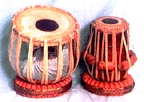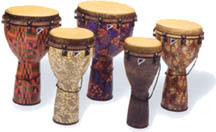There was once a boy whose father had acquired vast lands,
many cars, and great privileges. Power and prestige flowed through the
hallways of their house like a dark and silent river. Senators and other
menial servants waited on the fathers’ word and did what was wanted. The
boy was impoverished by his glittering world. He was made to attend so
many concerts as a child (when he should have been playing) that he could
not hear music. He traveled widely in what his family called "exotic places"
(which meant they did not like what they saw). Thus he learned not to see.
Worst of all? The dark river of influence that eddied quietly in the large
dining room and sumptuous bedrooms of that large house had stunted the
boy’s ability to feel.
Eventually the boy grew to take his father’s place. Raised in such a
way that power and prestige were taken for granted the young man had put
down no roots of his own. This made him weak in the way that most often
is hidden by brusque orders and imperious commands. His poverty made him
restless and angry but he had never been taught how to earn his way so
all his enterprises merely gathered up more things to put in the house.
There were chairs and tables, paintings and statues, rugs and drapes, pots
and pans, silver and plates. There was indeed enough for a village and
still he was poor. The sad truth was that this man now could go many places
and bring back nothing but what he could buy and carry in his hands.
The man once used money to fly in a plane. Then he bought a ticket to
ride on a train. Finally he hired a car and a driver to drive him over
dusty and rutted roads. Eventually he came to a small village in a great
forest. All his travels had brought him to what he considered an exotic
place where his parents had never taken him. It was a green and warm place.
The trees were tall and not like the ones along the driveways to the houses
at home. He did not know the names of the trees or even if the fruit was
good to eat. The sun was stronger here than at home and the dark shadows
of the trees moved constantly in a way that fluttered at the edges of the
man’s vision. The people did not speak his language and he had no
money that they recognized as currency. The bored driver did know the language
and made arrangements for their meals and a place to stay. The man grew
annoyed at having to ask the driver what people said but realized it was
necessary. The man felt he was having an adventure and, of course, that
made his visit an adventure. The man accepted the food that he did not
recognize and smiled all the time to let the people know he meant no harm.
He was not aware of the fact the people of the small village considered
him something of a grinning idiot who could do nothing for himself.
"What is he doing here?" they asked the driver.
The driver shrugged and said he didn’t know but when the man asked the
driver what had transpired the driver told him the people were welcoming
him to their humble village. This made the man feel good. The driver knew
he would be paid more if the man had a pleasant time there.
The people went about their business as always. Cattle were tended.
Fields were weeded and watered. Pottery was formed and fired. Clothes were
washed. Meals were made. All the while the people of the village made music
together that made the tasks easier. There was a song for tending cattle,
a song for the fields, a song at the wheel as the clay turned into pots.
In the evening the people of the village rested and made music that told
of their joys and sorrows. The man felt pride that he had found this place
where his parents had never gone. "Maybe", a small voice in his heart said
quietly, "this is where I can find riches".
The man though was also confused in this warm and green place. Here
he did not have the many things in his house that he knew so well. He had
no employees to bring him his meals and clothes. There was power and prestige
but it did not flow around him like a warm coat. It was outside his influence
and thus vaguely threatening and something to be watched.
He was wary of the music the people made. It was not like the concerts
he had heard at home. He did not know what the words meant. He could not
hum the melodies. The rhythms overlapped. The man saw a drum of rosewood
that one villager used each evening. The drum had a taut goatskin head.
The drummer, by striking the middle or the edge of the head, could produce
a deep and resonant voice or a staccato tattoo that punctuated the songs.
The man could feel the sound of the drum in his stomach. His feet tapped
to the sound and he was happy but he did not know why.
After three days the man felt he had been in the village long enough.
An urge to see his own house had grown quietly in the man’s heart. The
urge had been there on the plane, on the train and in the car. The urge
had flowered in the village where at least a part of him knew he was a
grinning fool. He wanted the things and the people and the attitudes
he knew. This urge grew more insistent despite the tending of the cattle,
the watering of the fields, the working of the pottery, the cooking of
the meals and the music of the villagers. The man, being so poor, felt
he had to take away with him some riches that would mark his visit. He
wanted something to show of the exotic place he had been.
The man asked the driver to speak with the drummer about the rosewood
drum with the goatskin head. After much discussion and waving of hands
the driver strode triumphantly back to the car with the drum in hand. The
man and driver went over the dusty and rutted roads to the railhead. The
man gave the driver money for his work. The man rode the train to the city
and bought a ticket at the airport. He paid porters to carry his trunks
and soon he was on a plane that would take him home.
The drum was ensconced in a place of honor at the man’s house. When
visitors came to the house the man would tell of his visit to the village
and point to the drum. The drum became an artifact that was much admired,
a sign of the man’s power and abilities.
As time went by, as it always does, the drum changed. The rosewood became
dry and tiny cracks appeared in the wood. The man did not know that the
drummer had rubbed the drum each day with oil. The man did not know that
the oil and the sweat of the drummer’s hands had made the wood supple and
alive. The goatskin head too became stiff and hard. The man was unaware
the oil, used for cooking meals in the village, was also used by the drummer
each evening. The drummer’s sweat, again mixed with the oil, had brought
life to the goatskin and kept it soft. So the drum aged.
The man aged too. His hands did no hard labor but still they developed
a network of tiny cracks. They became hard and stiff. The man’s eyes, unused
to seeing clearly, became clouded. The man’s heart, unused to feeling,
had ignored many things and eventually that most vital of rhythms came
to an end.
Many senators and rich men came to honor the man when his body was buried.
A large and ornate stone marked his grave. Somber voices spoke of the man’s
achievements and mourned his loss. These rites and recitations were part
and parcel of that dark river of power that stilled flowed through the
big house. The man’s family went on. His widow and children bought new
chairs and tables, new paintings and statues, new silver and plates. New
enterprises were assayed. More things flowed to that center of influence
and affairs went forward. Eventually the man was forgotten in the hurly-burly
of acquisition and the swirl of social events. In one corner of the attic
the man’s trophies and artifacts had been relegated to gather dust. Only
you and I know the silent drum gives mute testimony to the poverty that
had dogged the man all his days.


